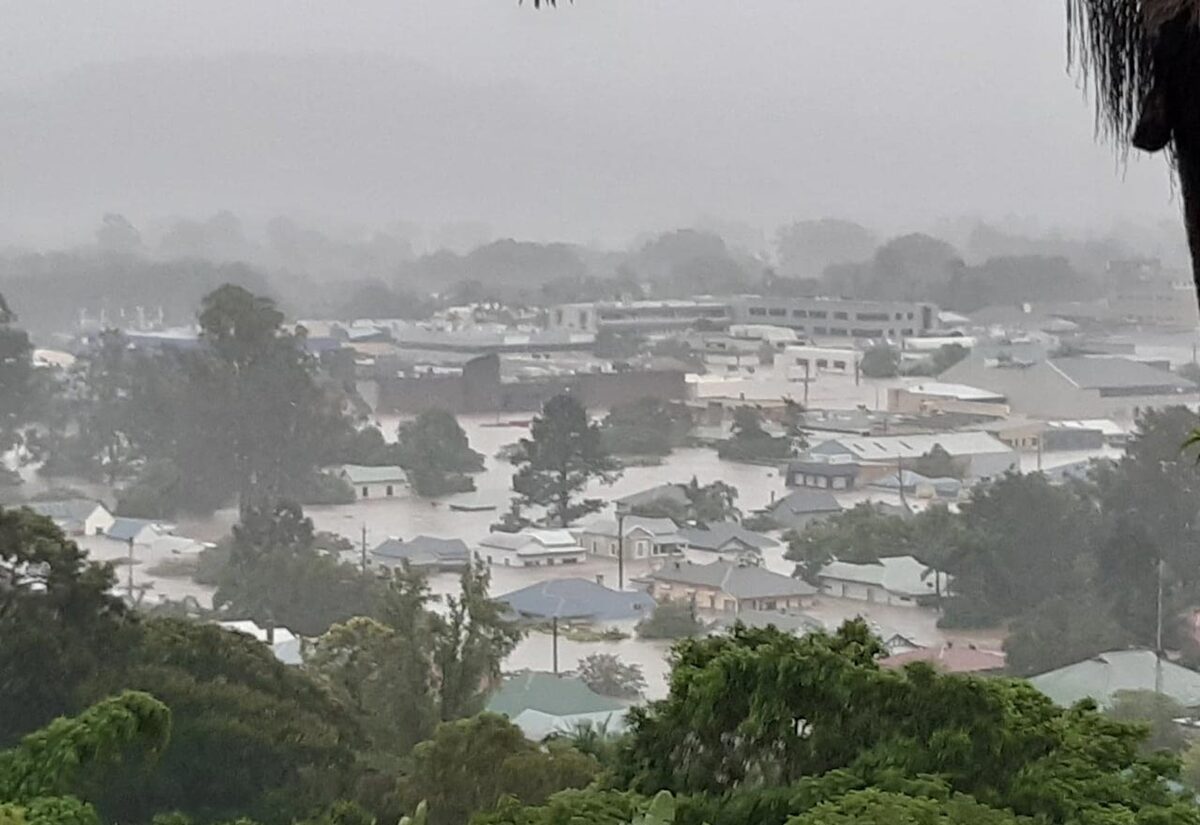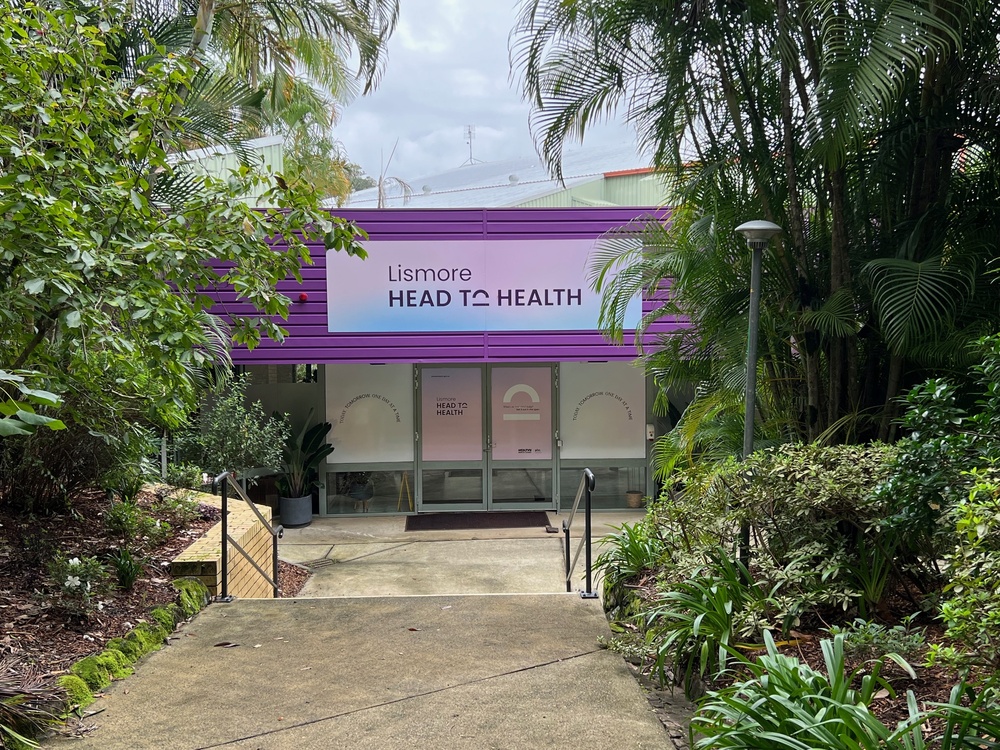February 2022 floods still has mental health impact
Simon Mumford
22 October 2024, 8:02 PM
 The view from Girards Hill on February 28 2022
The view from Girards Hill on February 28 2022Following the February 2022 big flood, we were told that mental trauma would result for quite a few residents who were living in the floodplain at the time, especially those who were rescued from their properties.
We were also told that this mental trauma, or PTSD, will likely present itself 'down the track' and not immediately.
In Talking Lismore last week, we spoke to Emma Schubert, a psychologist and the Clinical Service Manager for Head to Health based at Southern Cross University, to find out if people are still coming forward, what PTSD signs relatives, friends and neighbours should look out for and how to have a conversation about getting help Podcasts.
Ironically, Emma said Head to Health had three flood-affected people make appointments last week.
It is good to know upfront that Head To Health is a federally funded clinic, which is free for the public to use.

So far this storm season, Lismore has experienced two minor floods (August 13, 4.23m and September 29, 5.97m). It is early in the season, so it is possible that we could experience more flooding during the end of 2024 and the first three months of 2025 when the storm season is at its peak.
Emma talked about how common it is for people's anxiety to build when rain hits the roof.
"That is an incredibly common story in Lismore and the Northern Rivers, even for those of us that don't have a direct flood experience. I think if there's too much rain in this neck of the woods, everybody becomes nervous, and we start to see anxiety going up. Sleep becomes poorer, those sort of things start to happen.
"Flood trauma doesn't have a timeframe. We know that in those early days, people were just in survival mode. So what people really needed was practical support. Where's my next meal coming from? How am I going to get my kids to school? So in the early days, we didn't see a lot of presentations directly related to floods, but for the last 18 months, it's a huge part of what we support at Head to Health. I think we're getting a little surge again after that heavy rain last week or the week before.
"These are people who are living in flood houses. There was lots of talk about buybacks and the frustrations and difficulties about buybacks, and none of them have had any mental health support since the flood. This is a common story for us, that people are just coming out of the woodwork at all different times."
When it comes to signs that people know they should seek professional help to help with their flood trauma, Emma said sleep, appetite and emotional regulation are common.
"It's often things like, 'I'm noticing that my sleep has declined again'. So I had a few sleepless nights while the heavy rain was happening, and my sleep hasn't gone back to normal since then. So, something happened with sleep, or something happens with appetite or emotional regulation. So I feel like I've just kind of been keeping a lid on everything, but now I'm really snappy or really frustrated or fighting with my partner or something else.
"When it's getting quite serious, we would see drops in hygiene, unable to shower, unable to take care of yourself, and maybe even not being able to do your activities of daily living. So not being able to get to work, more absentees and more sick leave. Those things would be quite up the severe end of the scale."
Of course, acknowledging those signs within yourself is one thing but picking up the phone or walking into Head to Health to book an appointment is totally a different proposition.
"I think it's getting better. I've been a psychologist since 2009, and even in that time, I've seen a lot of change in mental health stigma, more in the younger generations, that people now accept that this is part of being human. But I do think for certain populations, it's embarrassing or shameful to have mental health struggles.
"I think that people think the system is going to be complicated. It's quite common in mental health services for there to be, you've got to have this referral from this person, and you've got to pay this gap, and you've got to make sure that you fill in all this. It's quite complicated. So, I think that might be a barrier for some people, and the other part of PTSD is avoidance.
"You spend a lot of time and energy trying not to think about the bad thing. So, I think going to counselling for a trauma, you also kind of know that you're going to have to talk about the bad thing, which is terrifying. I think humans are naturally resilient, so we've all found ways to cope with whatever the stuff is, and there's usually some avoidance in the mix. It's usually, how do I stop those thoughts? What do I do when those feelings that I don't like turn up? How do I stay busy enough? How do I stay stoned enough? Whatever the solution is, human beings come up with solutions to pain.
"So, to go to counselling and be willing to kind of look at that pain and you know, you don't need to tell the whole story. You don't need to dig through it in kind of forensic detail, but part of counselling is kind of learning to tolerate and accept what's happened and what's inside you. And I think that's pretty terrifying."
For that reason, Emma explains the sessions don't just dive in to discuss the root cause but build to a better understanding over a number of sessions.
If you are a relative, a friend or neighbour and you notice the person having recurring nightmares, it is time to have a careful conversation.
"The things that we're looking for with PTSD, the really big one, is re-experiencing, so nightmares or flashbacks. If you're hearing that somebody is having flood nightmares, or flood kind of themed nightmares, or flashbacks where they actually kind of lose touch with reality and get pulled back into those memories, then that's a pretty clear sign that they're going to need some professional help.
"At this point, if somebody has PTSD, it's very unlikely to resolve on its own. They're going to need some professional help. So I would say that a brave conversation about I've noticed these things. You're telling me that you're still having nightmares about the flood. I'm noticing that things seem to be getting a bit harder for you. I know this place that might be able to help you.
"Most of our referrals now do come from word of mouth. So, we have whole streets in South Lismore, where every single person in the street is a client of ours because one person was brave enough to come, and then told their neighbours that it was helpful.
"We have a multidisciplinary team. You might see a psychologist, you might see a counsellor, you might see a mental health social worker. It's a mix of people, but everybody's trained in being supportive, training people, trauma informed care, and we have a variety of models to kind of process that trauma and whatever else is going on. We also get referrals for depression, anxiety, all the usual mental health things.
Emma discussed the fact that mental health care can be expensive in Australia. The normal practice is to get a referral from your GP to get a Medicare plan, see a counsellor or psychologist and still pay $100 out of pocket until you reach a threshold, depending on your circumstances.
"We are getting to a point in history where mental health care is becoming only for the rich. Because we have a mental health care plan system where you can get 10 sessions from your GP, but very, very few psychologists or appropriately qualified social workers don't have a gap. So most often, you have to go to your GP to get the Medicare plan, and then you have to pay $100 plus on top of that, which makes me furious because what kind of civilised society only retains mental health care for the rich?
"It's part of what Head to Health is trying to address. All of our services are completely funded by the federal government, so there's no money, there's no gap. You don't need a mental health care plan. It's all been paid for by the government appropriately, as is appropriate in a town like Lismore.
"People often say it almost feels too good to be true. People are confused that this is free mental health care. We pay our taxes so that services like this can exist and support people who otherwise wouldn't be able to access help."
Head to Health Lismore is a bulk-billed mental health support service based at Southern Cross University. There is no red tape.
You can call Head to Health directly on 0482 161 784 or call 1800 595 212.
You can walk in and make an appointment and may be lucky enough to see someone right away. The address is Lismore Health Precinct, Southern Cross University, P Block North, Rifle Range Road, East Lismore. You will see carparks marked 'clinic parking only', you can park there.
"We're at the back of the building. So, you literally just follow the path to the back of the building. There' you'll see a big purple Head to Health awning," Emma said.
You can also check out their website https://headtohealthnc.org.au/.
The full podcast with Emma Schubert from Head to Health can be heard through the Lismore App Podcasts or by clicking the News tab on the Lismore App website and then click Podcasts https://talkinglismore.buzzsprout.com/.

